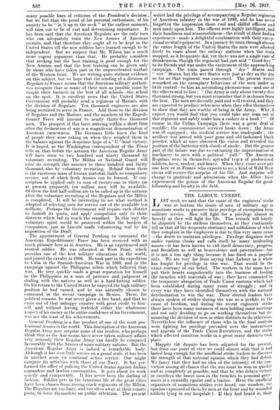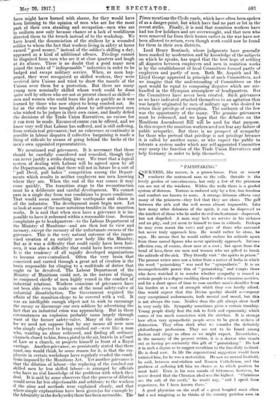THE LABOUR UNREST.
AST week we said that the cause of the engineers' strike J was at bottom the desire of men of military age in munitions works to preserve their privilege of exemption front military service. Men will fight for a privilege almost as fiercely as they will fight for life. This remark will hardly be disputed by the strikers themselves, as they continually tell us that all the desperate obstinacy and selfishness of which they complain in the employers is due to this very same cause —the desire to maintain privileges. Privilege disguises itself under various cloaks and calls itself by many misleading names—it has been known to call itself democracy, progress, and Socialism as well as benevolence and paternalism—but it is not a less ugly thing because it has fixed on a popular title. We are very far from saying that Labour as a whole has fought for privilege in this war. That would be the exact contrary of our belief. The workers in the mass have put their hearts magnificently into the business of feeding the trenches with materials of war ; they have consented to the temporary abrogation of Trade Union customs which had been established during many years of struggle ; and in every way they have identified themselves with the national determination to win the war. Their elected leaders have always spoken of strikes during the war as a perfidy to the cause of freedom, and during the recent engineers' strike there have been many instances of men holding mass meetings and not only deciding to go on working themselves but de- nouncing the decision of men in other districts to do otherwise. Nevertheless the influence of those who in the final analysis were fighting for privilege prevailed over the 'instructions and appeals of the Trade Union Executives, and the strike which affected munition works in a great many districts took place. Happily the dispute has been adjusted for the present, but from one point of view we could almost wish that it had lasted long enough for the unofficial strike leaders to discover the strength of that national opinion which they had defied. We fancy that they had no idea of the intensity of the con- viction among all classes that the war must be won as quickly and as completely as possible, and that he who delays victory or sacrifices the brave men in the trenches to personal griev- ances is a cowardly egotist and a traitor. Have the unofficial organizers of munitions strikes ever heard, one wonders, the opinion expressed of them by men at the front and by wounded soldiers lying in our hospitals? If they had heard it, their faces might have burned with shame, for they would have been listening to the opinion of men who are for the most part of their, own standing and occupation—men who are in uniform now only because chance or a lack of worldliness directed them to the trench instead of to the workshop. We have heard. the denunciation of the strikers by a wounded soldier to whom the fact that workers living in safety at home earned "good money," instead of the soldier's shilling a day, appeared as a kind of additional offence. Privilege cannot be disguised from men who see it at close quarters and laugh at its aliases. There is no doubt that a good many men joined the ranks of " indispensable " industries in order to be bodged and escape military service. When, as soon hap- pened, they were recognized as skilled workers, they were received into Unions and tried to draw the mantle of the Unions over them for a protection. But there are many young men nominally skilled whose work could be done quite well by others who are not at present classed as skilled— men and women who could learn the job as quickly as it was Learned by those who now object to being combed out. So far as the strike was brought about by self-interested men who wished to be judges in their own cause, and finally defied the decisions of the Trade Union Executives, no excuse for it can ever be made. Excuses of course can be offered, and we know very well that Labour has suffered, and is still suffering, from certain real grievances; but no coherence or continuity is possible in labour disputes if collective bargaining is made a thing of ridicule by means of going behind the backs of the men's own appointed representatives.
We mentioned real grievances. It is necessary that these should be carefully considered and remedied, though they can never justify a strike during war. We trust that a logical system of dealing with Labour will be agreed upon by all the Departments, and that there will not in future be a sort of pull Devil, pull baker" competition among the Depart- ments which results in neither employers nor men knowing where they are. When the end of the war comes it may come quickly. The transition stage to the reconstruction must be a deliberate and careful development. We cannot pass in a single day from war conditions to peace conditions. That would, mean something like earthquake and chaos in all the industries. The development must begin now. Let us look at some of the more notorious troubles in the munition works. It is said that when men have a grievance it is im- possible to have it redressed within a reasonable time. Serious complaints go to headquarters—to the Labour Department of the Ministry of Munitions—and are then lost to view and memory, except the memory of the unfortunate owners of the grievance. This is the very natural outcome of the impro- vised creation of an entirely new body like the Ministry. But as it was a difficulty that could easily have been fore- seen, it was also a difficulty that could have been overcome. It is the tendency of all rapidly developed organizations to become over-centralized. Often the very brain that conceived and carried through a great act of creation is the brain responsible for clinging to a multitude of duties that ought to be devolved. The Labour Department of the Ministry of Munitions could not, in the nature of things, be composed chiefly of men highly versed in the conduct of industrial relations. Workers conscious of grievances have not been able even to make use of the usual safety-valve of industrial dissatisfaction. The Government required the affairs of the munition-shops to be covered with a veil. It was an intelligible enough object not to wish to encourage the enemy or discourage our own soldiers by advertising the fact that an industrial crisis was approaching. But in these circumstances an explosion probably came largely through want of the former safety-valve. Many of the strikers— for we need not suppose that by any means all were men who simply objected to being combed out—were like a man who, wanting an abuse redressed, and finding all ordinary channels closed to him, fires a pistol in the air, brawls in a Court of Law or a church, or projects himself in front of a Royal carriage. Another grievance, so persistently stated that there must, one would think, be some reason for it, is that the em- ployers in certain workshops have regularly evaded the condi- tions imposed by the Munitions Act. Yet another grievance is that the dilution of labour—the replacing of the combed-out skilled men by less skilled labour—is arranged by officials who have no real knowledge of the problems with which they deal. It is said by some observers that the process of dilution would seem far less objectionable and arbitrary to the workers if the aims and methods were explained clearly, and that where simple explanations have been given (as for example by the Admiralty in the dockyards) there has been no trouble. The Times mentions the Clyde yards, which have often been spoken of as a danger-point, but which have had no part or lot in the recent strike. Finally, it is said that munition workers have had too few holidays and are overwrought, and that men who were removed far from their homes earlier in the war have not been allowed to return, even though work could now be found for them in their own districts.
Lord Henry Bentinck, whose judgments have generally been marked by moderation and by knowledge of the aubjects on which he speaks, has urged that the best hope of settling all disputes between employers and men in munition works is by the establishment of local Committees formed partly of employers and partly of men. Both Mr. Asquith and Mr. Lloyd George approved in principle of such Committees, and we imagine that the understanding of Committees on the spot would be equal to composing disputes which are mis- handled in the Olympian atmosphere of headquarters. But the Committees have never been created. Such grievances as we have indicated attached themselves to an agitation that was largely originated by men of military age who desired to retain their privilege of exemption. The outburst of the few was the opportunity of the many. The genuine grievances must be redressed, and we hope that the debates on the Munitions Amendment Bill will be used for that purpose. In this respect the munition workers need not fear any failure of public sympathy. But there is no prospect of sympathy for those who pretend that privilege is not privilege because it is called by another name, or who expect the public to tolerate a system under which any self-appointed Committee may usurp the function of the Trade Union Executives and help Germany in order to help themselves.



























 Previous page
Previous page